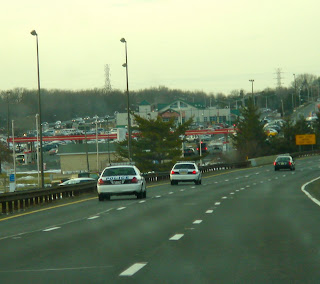Police Officers Driving While Under the Influence...of Grief

Today, January 20, 2011 was the funeral for a Lakewood, NJ police officer who was killed while in the line of duty. My daughter and I were down in Toms River, a few miles south of Lakewood, for the day visiting my mom's 82 year old cousin, who has lung cancer, and is one of the most inspirational woman I know with an amazing sense of humor and compassion for people.
Since I am a grief counselor and grief educator, grief and loss are probably on my mind a lot more than most. I was supposed to visit my cousin tomorrow but with snow in the forecast I decided to see her today as I didn't want to cancel again due to snow. Hence I don't know how much longer she will be alive. She is my mom's only living relative so I try to see her as often as I can. My mother died 17 years ago, also from lung cancer, and I have learned not to take anyone's life for granted, knowing fully well that there is no guarantee that when we say goodbye in the morning to our family members, that we all will all be home again that evening. I have sat with many grievers and know that accidents and tragedies happen and life as we know it can change in an instant.
After a wonderful visit with my cousin, my daughter and I got on the Garden State Parkway heading north, I began to notice many police cars driving along with us. I was initially alarmed and then realized that they were returning from the funeral. We saw local police cars, state police cars, Sheriff Cars and many unmarked cruisers, and even the federal reserve police. We took note of the town names we spotted which included: Roselle,New Providence, Newark, New York City, North Haledon, Jersey City, Nutley, Bellville, Hudson County, and more. I asked my daughter to take a few photos as it was something I had never seen before.
Then,I began to think about the grief that these officers were experiencing coming from a funeral of a 27 year old officer who was soon to be married. It dawned on me that our bravest men and women were driving under the influence....of grief. At that moment, I wished that I could create a mandatory highway stop up ahead to screen all of the officers for DUIG (Driving While Under the Influence of Grief).
Each officer that was driving, would be stopped and screened for grief. After a few questions and observations, a determination would be made to see how impaired the driver is by their grief. Those exhibiting many signs of grief, instead of giving breathalyzers, would be offered additional aid and comfort which would include: rest, an opportunity to chat for a few minutes or longer, before getting back into the car to return to work or home. They would be given water, as grief can dehydrate the body, coffee, as grief can make one tired, healthy snacks, as grief can diminish the appetite, some Kleenex, a couch to sit upon or even to nap upon, as grief can be exhausting, and some loving listeners who would simply listen to the officers' feelings. No one would force them to talk. Some people are not big talkers but think a lot about their loss. Drivers would learn how important it is to find healthy outlets to express their grief and told to avoid alcohol and other potentially dangerous outlets while grieving, as judgment and concentration is often already impaired. They would also be reminded that many drivers channel their unexpressed grief into road rage.
They may get in touch with some of their feelings of grief which could include anger, sadness, fear, confusion, rage, despair, loneliness and more. They would be given an opportunity to talk about it, even cry if they were able. Many of the officers are male and in our society crying is unfortunately discouraged in boys and men as it tends to be viewed as feminine and weak. Brave public servants have the additional pressure to "keep it together" and "stay strong" for the rest of us. Often their need to grieve isn't acknowledged by themselves or others. Some tend to avoid or numb their grief. But grief must be acknowledged in order to heal. "You can't heal what you don't feel." After the stop each driver would be given a journal and encouraged to use it as a healthy outlet for their grief. Letter writing to someone who died can be very helpful. Lastly they would receive hot line numbers including the National Suicide Prevention Lifeline 1-800-273-TALK and COP 2 COP,1-866-COP-2COP, a 24/7 helpline for NJ law enforcement officers and their families
My experience on the highway today made me reflect on the overwhelming amount of grief that police officers deal with in so many ways, day in and day out, that the public is often unaware of. As I imagined my DUIG highway stop, and enjoyed the vision of providing much needed support to those in need, I thought of how I would love to find ways to reach out to police officers. I think that thanking them, sharing a few words or even offering a smile is a start.
And...maybe I too was driving under the influence of grief, as I found myself missing my mother and feeling saddened as I thought about the impending loss of my wonderful cousin.
Comments
Post a Comment